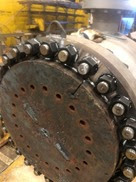Everything you need to know about hydraulic jack
Everything you need to know about hydraulic jack
Since they were first created, jacks have found extensive use in many different fields to raise large forces or heavy weights. Although they all carry out similar functions, there are various types of jacks available. Hydraulic jacks and Mechanical jacks are the most widely used ones in various industrial settings and are readily available. While hydraulic jack employ hydraulic power to lift large machinery, mechanical jacks use screw threads. This jack is frequently employed in the automobile sector. Let’s check out some of the important information about hydraulic jacks before you make use of one of them for your industrial use.
What are Hydraulic Jacks ?
Heavyweights are raised mechanically using hydraulic jacks. They are referred to as a type of hydraulic car jack since they are frequently employed in the automotive industry to lift vehicles off the ground. Jacks typically have a maximum lifting capacity rating, such as 1.5 tonnes or 3 tonnes. Industrial jacks have load ratings that can reach numerous tonnes.
Applications of Hydraulic Jacks
Jacks are used to lift and move big loads, release vertical forces from weight-bearing elements to provide room for repairs, and perform other tasks across a variety of industries. Equipment of this nature, such as hydraulic jacks, is also utilised in the construction, shipbuilding, automotive repair, and other specialised industries. The uses for hydraulic jacks as well as other types of jacks are
Shipbuilding
Railroad
Mobile Home
Marine
Locomotive
Laboratory
General Industrial
Construction
House moving
Cable tensioning
Bridges
Automotive
Aircraft
Tractors & trailers
Advantages of Hydraulic Jack
Here are a few benefits of hydraulic jacks.
It is highly effective with heavy loads and takes up less space.
They are also less likely to get jammed as a result of rust in the screw thread.
It is simpler to operate and lifts loads with little effort.
Compared to screw jacks, it is a little lighter.
Disadvantages of hydraulic jack
Here are a few Hydraulic Jack drawbacks.
It is prone to malfunction Serious issues may arise if the oil seals are worn out.
It moves along at a sluggish pace.
When used excessively, hydraulic oil can release an unpleasant odour and heat up quickly.
Pollution of land and water can result from hydraulic oil leaks.
What is the principle of the hydraulic jack?
Pascal's law serves as the foundation for hydraulic jack operation.
Who invented the hydraulic jack?
In 1851, Richard Dudgeon received a patent for a "Portable Hydraulic Press."
Conclusion
When compared to a standard jack, hydraulic jacks can readily raise heavier loads to a higher height with lesser force. Hydraulic fluid connects the tiny and large cylinders to produce this output, which serves to lessen the lifting force required from people. These tools are very helpful in the mining industry to execute tasks more quickly, easily, and safely.




Comments
Post a Comment